Order-3-7 heptagonal honeycomb
| Order-3-7 heptagonal honeycomb | |
|---|---|
| Type | Regular honeycomb |
| Schläfli symbol | {7,3,7} |
| Coxeter diagrams | |
| Cells | {7,3} 
|
| Faces | {7} |
| Edge figure | {7} |
| Vertex figure | {3,7} |
| Dual | self-dual |
| Coxeter group | [7,3,7] |
| Properties | Regular |
In the geometry of hyperbolic 3-space, the order-3-7 heptagonal honeycomb a regular space-filling tessellation (or honeycomb) with Schläfli symbol {7,3,7}.
Geometry
All vertices are ultra-ideal (existing beyond the ideal boundary) with seven heptagonal tilings existing around each edge and with an order-7 triangular tiling vertex figure.
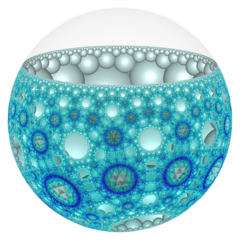 Poincaré disk model |
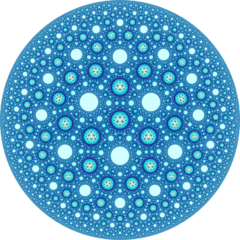 Ideal surface |
Related polytopes and honeycombs
It a part of a sequence of regular polychora and honeycombs {p,3,p}:
Order-3-8 octagonal honeycomb
| Order-3-8 octagonal honeycomb | |
|---|---|
| Type | Regular honeycomb |
| Schläfli symbols | {8,3,8} {8,(3,4,3)} |
| Coxeter diagrams | |
| Cells | {8,3} 
|
| Faces | {8} |
| Edge figure | {8} |
| Vertex figure | {3,8} {(3,8,3)} |
| Dual | self-dual |
| Coxeter group | [8,3,8] [8,((3,4,3))] |
| Properties | Regular |
In the geometry of hyperbolic 3-space, the order-3-8 octagonal honeycomb is a regular space-filling tessellation (or honeycomb) with Schläfli symbol {8,3,8}. It has eight octagonal tilings, {8,3}, around each edge. All vertices are ultra-ideal (existing beyond the ideal boundary) with infinitely many octagonal tilings existing around each vertex in an order-8 triangular tiling vertex arrangement.
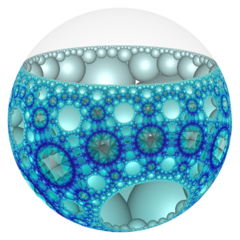 Poincaré disk model |
It has a second construction as a uniform honeycomb, Schläfli symbol {8,(3,4,3)}, Coxeter diagram, ![]()
![]()
![]()
![]()
![]()
![]() , with alternating types or colors of cells. In Coxeter notation the half symmetry is [8,3,8,1+] = [8,((3,4,3))].
, with alternating types or colors of cells. In Coxeter notation the half symmetry is [8,3,8,1+] = [8,((3,4,3))].
Order-3-infinite apeirogonal honeycomb
| Order-3-infinite apeirogonal honeycomb | |
|---|---|
| Type | Regular honeycomb |
| Schläfli symbols | {∞,3,∞} {∞,(3,∞,3)} |
| Coxeter diagrams | |
| Cells | {∞,3} 
|
| Faces | {∞} |
| Edge figure | {∞} |
| Vertex figure | |
| Dual | self-dual |
| Coxeter group | [∞,3,∞] [∞,((3,∞,3))] |
| Properties | Regular |
In the geometry of hyperbolic 3-space, the order-3-infinite apeirogonal honeycomb is a regular space-filling tessellation (or honeycomb) with Schläfli symbol {∞,3,∞}. It has infinitely many order-3 apeirogonal tiling {∞,3} around each edge. All vertices are ultra-ideal (Existing beyond the ideal boundary) with infinitely many apeirogonal tilings existing around each vertex in an infinite-order triangular tiling vertex arrangement.
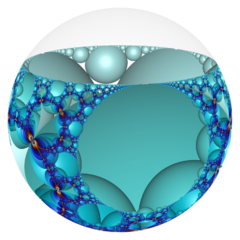 Poincaré disk model |
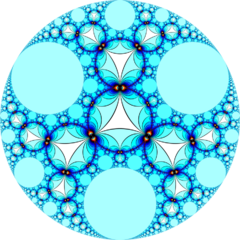 Ideal surface |
It has a second construction as a uniform honeycomb, Schläfli symbol {∞,(3,∞,3)}, Coxeter diagram, ![]()
![]()
![]()
![]()
![]()
![]() , with alternating types or colors of apeirogonal tiling cells.
, with alternating types or colors of apeirogonal tiling cells.
See also
- Convex uniform honeycombs in hyperbolic space
- List of regular polytopes
- Infinite-order dodecahedral honeycomb
References
- Coxeter, Regular Polytopes, 3rd. ed., Dover Publications, 1973. ISBN 0-486-61480-8. (Tables I and II: Regular polytopes and honeycombs, pp. 294–296)
- The Beauty of Geometry: Twelve Essays (1999), Dover Publications, LCCN 99-35678, ISBN 0-486-40919-8 (Chapter 10, Regular Honeycombs in Hyperbolic Space) Table III
- Jeffrey R. Weeks The Shape of Space, 2nd edition ISBN 0-8247-0709-5 (Chapters 16–17: Geometries on Three-manifolds I, II)
- George Maxwell, Sphere Packings and Hyperbolic Reflection Groups, JOURNAL OF ALGEBRA 79,78-97 (1982) [1]
- Hao Chen, Jean-Philippe Labbé, Lorentzian Coxeter groups and Boyd-Maxwell ball packings, (2013)[2]
- Visualizing Hyperbolic Honeycombs arXiv:1511.02851 Roice Nelson, Henry Segerman (2015)
External links
- John Baez, Visual insights: {7,3,3} Honeycomb (2014/08/01) {7,3,3} Honeycomb Meets Plane at Infinity (2014/08/14)
- Danny Calegari, Kleinian, a tool for visualizing Kleinian groups, Geometry and the Imagination 4 March 2014. [3]
 |
